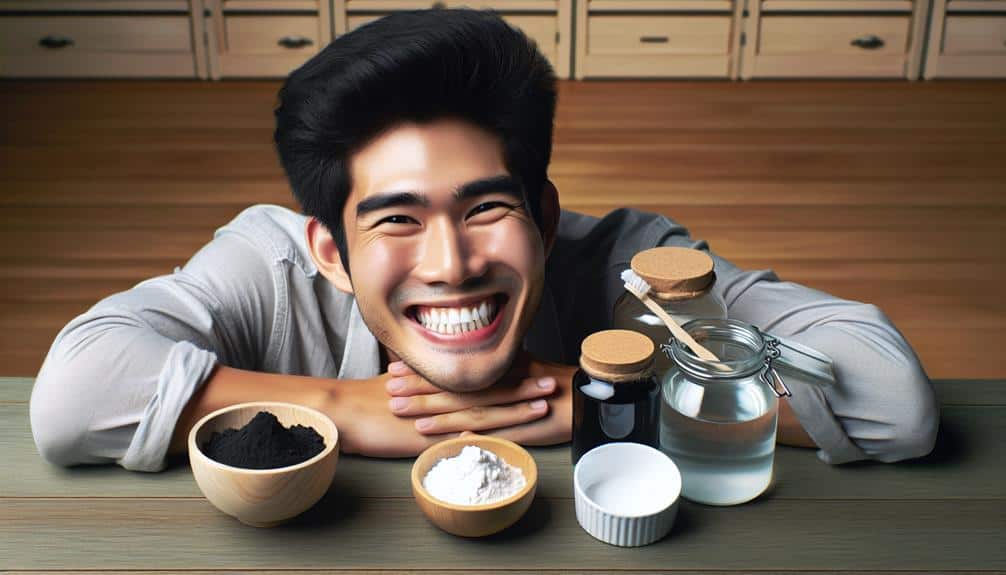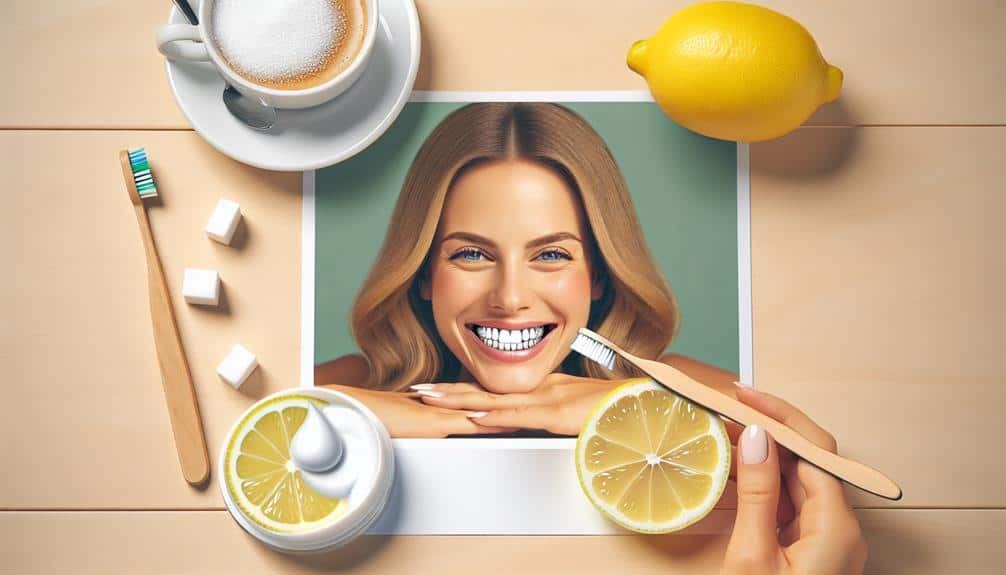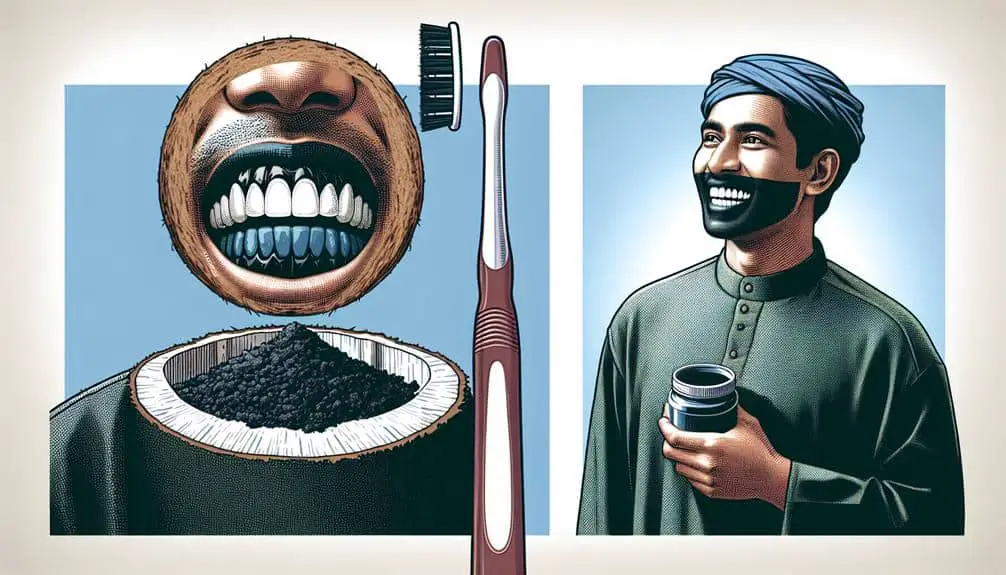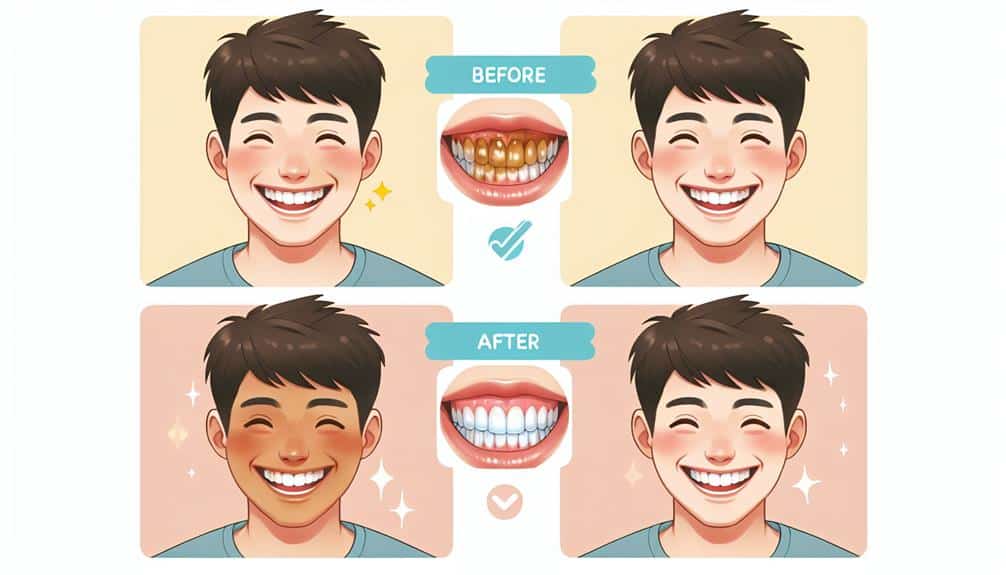To remove coffee stains from your teeth, try natural remedies like fruit peels with whitening agents or baking soda to scrub away surface stains gently. These compounds help break down stains for a brighter smile. DIY solutions such as lemon juice mixed with baking soda can create a paste to remove discoloration. Remember, consult a dental professional before starting any whitening treatment. Following instructions and maintaining good oral hygiene is essential. By incorporating these tips into your routine, you can effectively combat coffee stains and achieve a whiter smile. Why not discover more about effective home remedies and precautions for lasting results?
Key Points
- Fruit peels like orange or banana contain natural whitening agents to break down coffee stains.
- Baking soda's mild abrasiveness helps scrub away coffee stains gently.
- Lemon juice mixed with baking soda forms a paste to remove coffee stains effectively.
- Hydrogen peroxide can break down coffee stains but may cause tooth sensitivity at high concentrations.
- Consistency in using natural remedies like coconut oil pulling can help whiten teeth over time.
Benefits of Natural Tooth Whitening
When looking to whiten your teeth naturally, you can benefit from the gentle and effective methods that avoid harsh chemicals commonly found in commercial products. Fruit peels, such as orange or banana peels, contain natural whitening agents like d-limonene and citric acid. These compounds help to break down stains on the teeth's surface, revealing a brighter smile. Simply rub the inner part of the fruit peel on your teeth for a few minutes daily to see best results.
Another natural remedy that can help whiten your teeth is baking soda. Baking soda has mild abrasive properties that can scrub away surface stains on your teeth without causing damage to the enamel. It also creates an alkaline environment in your mouth, which can inhibit the growth of bacteria that contribute to discoloration. You can mix a small amount of baking soda with water to form a paste and brush your teeth gently with it a few times a week for excellent results.
Common Coffee Stain Causes
Coffee stains on teeth are typically caused by the dark pigments present in coffee beans that adhere to the tooth enamel over time. Regular coffee consumption can lead to tooth discoloration due to the impact of coffee on teeth color. The chromogens in coffee, which are highly pigmented molecules, are the main culprits behind staining teeth. These molecules can latch onto the enamel of your teeth, causing them to become yellow or brownish in color.
When you drink coffee, these pigments settle on the surface of your teeth and gradually seep into the enamel, leading to stains that may become more pronounced over time. The acidity of coffee can also contribute to the erosion of tooth enamel, making it easier for stains to penetrate the teeth.
To prevent or minimize coffee stains, you can consider strategies like drinking water after consuming coffee to help wash away pigments, using a straw to reduce direct contact of coffee with your teeth, and maintaining good oral hygiene practices such as regular brushing and dental cleanings.
DIY Teeth Whitening Solutions
To combat the effects of coffee stains on your teeth, exploring do-it-yourself teeth whitening solutions can be a practical approach. Two popular methods include the lemon juice treatment and the baking soda paste. Lemon juice is known for its natural bleaching properties, and when mixed with baking soda to form a paste, it can help remove surface stains effectively. However, utilizing this method sparingly is crucial as the acidic nature of lemon juice can erode the enamel if overused.
Another DIY option is the hydrogen peroxide method. Hydrogen peroxide is a common ingredient in many whitening products due to its ability to break down stains. You can mix hydrogen peroxide with water and use it as a mouthwash, but be cautious as high concentrations can cause tooth sensitivity.
Coconut oil pulling is also gaining popularity for teeth whitening. Swishing coconut oil around in your mouth for a few minutes each day is believed to remove plaque and bacteria, leading to whiter teeth over time. Remember, consistency is key when trying these DIY solutions for teeth whitening.
Effective Home Remedies
Exploring effective home remedies for teeth whitening can provide a natural and affordable solution to combat stains and discoloration. Lemon juice and baking soda are two common household items known for their teeth-whitening properties.
Lemon juice contains citric acid, which has natural bleaching properties that can help lighten stains on teeth. However, it's essential to use this remedy sparingly as the acid in lemon juice can erode tooth enamel over time. To use, mix a small amount of lemon juice with water and swish it around in your mouth for a minute before brushing your teeth.
Baking soda, on the other hand, is mildly abrasive and can effectively scrub away surface stains on teeth. It also creates an alkaline environment in the mouth, which can help prevent bacteria growth. To use, mix a small amount of baking soda with water to form a paste and brush your teeth gently with it for a couple of minutes.
Incorporating these natural remedies into your oral care routine can help you achieve clean teeth and a bright smile.
Precautions and Maintenance
When considering teeth whitening treatments, it's important to understand the precautions and maintenance needed to guarantee safe and effective outcomes. Before starting any whitening regimen, it's essential to consult with a dental professional to make sure your oral health is at its best. They can recommend the most suitable whitening method based on your dental history and the extent of staining.
Preventive measures during and after whitening treatments are crucial to avoid any potential damage to your teeth and gums. Following the instructions provided with the whitening product is vital to prevent overuse or misuse, which can result in sensitivity or uneven whitening results. It's also recommended to avoid foods and beverages known to stain teeth, such as coffee, red wine, and tea, to maintain the whiteness of your teeth in the long term.
Long-term care plays a significant role in preserving the results of teeth whitening. Good oral hygiene practices, including regular brushing, flossing, and dental check-ups, are vital to prevent new stains from developing and to keep your smile bright and healthy. Remember, consistency in oral care is key to maintaining a radiant smile post-whitening treatment.
Frequently Asked Questions
Can Coffee Stains on Teeth Lead to More Serious Dental Issues in the Long Run?
Coffee stains on teeth can lead to more serious dental issues in the long run. Prevention is key through regular dental cleanings and limiting coffee consumption. Long-term effects may include enamel erosion, decay, and discoloration.
Are There Any Side Effects or Risks Associated With Using Natural Tooth Whitening Remedies for Coffee Stains?
When seeking to brighten your smile with natural remedies, be mindful of potential risks. Overuse of such options, like acidic fruits, may harm enamel. Balance natural alternatives with professional treatments for best whitening results and dental health.
How Long Does It Typically Take to See Results From Using Home Remedies for Whitening Coffee-Stained Teeth?
Consistency in using home remedies for whitening coffee-stained teeth is key. Applying them regularly can yield visible results in a few weeks. To maintain these effects, limit coffee intake and brush with whitening toothpaste for lasting brightness.
Are There Any Specific Foods or Drinks That Should Be Avoided to Prevent Coffee Stains From Reoccurring After Whitening Treatments?
To prevent coffee stains from reoccurring after whitening treatments, consider switching to coffee alternatives like green tea. Maintain good oral hygiene and regular dental check-ups. Avoid dark-colored beverages and foods like red wine that can contribute to staining your teeth.
Is Professional Teeth Whitening Recommended for More Severe Coffee Stains That Don't Respond to At-Home Remedies?
For more severe coffee stains unresponsive to at-home remedies, professional teeth whitening is recommended. In-office treatments provide stronger solutions and faster results compared to over-the-counter options. Consult with your dentist for the best professional alternatives.



